SBEC met on December 7th and 8th to take up a full agenda. On December 7th SBEC took up item #8 approving the EPP programs as presented for a 5-year renewal. SBEC also took up the following rule amendments/changes and approved them for publication in the Texas Register:
- Chapter 228, Requirements for Educator Preparation Programs
- Chapter 233, Categories of Classroom Teacher Certificates.
- chapter 239, Student Services Certificates, Subchapter A, School Counselor Certificate
On December 8th SBEC took up the remaining agenda items. This report below follows discussions from December 7th. A video archive of the meeting can be found here for Dec. 7th & here for Dec. 8th.
This report is intended to give you an overview and highlight of the discussions on the various topics taken up. It is not a verbatim transcript of the discussions but is based upon what was audible or understandable to the observer and the desire to get details out as quickly as possible with few errors or omissions.
Opening Remarks
- Welcome & Reminders
Public Comments
Michael Frensga UTSA
- Petition for rule change submitted – 250.30 rational rule making
- Example used of his PR submitted for cost on EdTPA as the reason needed for this rule change
Crystal Rose, Professor Tarleton University
- Impacts of residency program – improves student achievement and students are better prepared and more likely to stay in the profession
- Would save Texas schools over $40 million in hiring and induction cost each year
Rebecca Tuggle, Kinder Teacher and Graduate of Tarleton
- Shares experience in residency program such as benefit to having two teachers in classroom and experience before she was in the classroom on her own
Consent Agenda
- Motion and seconded to approve items 4-6 as presented
- Motion carries, consent agenda approved
Action Items
- Election and disciplinary will be taken up tomorrow
Item 8
- Link to materials
- Approval of EPP, reviewed every 5 years
- Rules require programs to maintain evidence of compliance for 5 yr, use a risk calculation to determine type of review, self-reports prior to 5-years, and compliance scored on s standardized rubric
- When a program is compliant then TEA will recommend review to SBEC
- Have reviewed 19 programs over the year, have brought 6 programs forward to SBEC
- Remaining 13 programs still in some stage of process
- Staff confirmed there was no issue with 13 remaining just where they were in timeline for review is why they were not brought forward
- Approval for programs as presented for a 5-year renewal; motion carries
SBEC went into closed session at 1:24pm to obtain advice of legal counsel under item #13, they returned at 3:12pm. No action was taken in closed session.
Item 9
- Link to materials
- Overview of item set to implement certification redesign priorities

- Item 9 Propose Repeal and New Chapter 228
Public Comment on Item 9
Robert DeHaas, Dallas College School of Education
- Commends efforts, inclusion of teacher residency is strong addition and requiring more robust observation
Katie Eisele, Clinical Practice Director for Teach Us
- Support for ongoing efforts of proposed changes to TAC 228
- Speaks of components in changes that are exciting like collaboration
- Budget will be a challenge and logistics will be a challenge, specifically around first six weeks
Elizabeth Bonilla, ESC 19
- Alt Cert program has undergone transformation in 5-year journey of teacher residency with three entities (foundation, rural district and them)
- Have seen residents offered positions before they finish residency, etc
Michael Frensga UTSA
- Question of change from 30 to 50 hour for field readiness
- Concerned of fiscal impact not mentioning cost to candidates
- T-TESS for field supervisors, many have advance degrees and 30 or more years in classroom – wonder how much more T-TESS training is needed
- Questions cost analysis from TEA on T-TESS
- Wish someone had called him and asked how expensive this would be for them
- Question from committee – isn’t there an option for T-TESS or training?
- Answer from staff confirms it is an “or”
Michale Marder, UTeach
- Declining number of teachers from university programs
- Large number of teacher entering field with no preparation whatsoever
- Do not have changes that increase cost of time and cost, which the current changes suggested do
- SBEC member – surprised advocating against this since some requirements are stricter for alt cert?
- Answer was off mic for first part
- Sure that these changes will increase cost
- 490 hours/70 days, don’t have day for missing etc so logistics are problematic
- Clarifies all the standards he mentioned are for the standard program
- SBEC member – data is always appreciated, wants background on complaint of not certified teachers?
- Compares those teaching with those in SBEC file and flags everyone who does not show up, District of Innovation (DOI) is one way to teach without a certificate and charter is another way but they may have some type of certification process behind the scenes
- Hearing of candidates writing rules, refusing to get certificate
- Certificate rule changes putting in place may not be controlling for quality they hope for
- SBEC member – could this be about DOI increase in applications which SBEC does not have control over, and maybe should address rise of uncertified teachers
- Advocacy is needed for idea that default should be that teachers have certificates
- DOI is now allowing for districts to check the box and certification no longer applies, fears this is beginning to spin out of control
Susanne Nesbitt, Texas Coalition for Texas Educator Preparation
- Appreciates thoughtful discussion, such as documentation of mastery in enhanced standard certificate
- Asks if some things are possible for residency on requirements, then why not all certificates, etc
- SBEC question – this item is not related to a performance assessment?
- Agree, this is related to curriculum but saying this is the place
Rae Queen, Teachworthy
- Information about informal observation – would like flexibility to meet needs of what candidates bring to the table such as opportunities to observe transition time, etc
- Programs should be able to ask how to meet needs of candidates, time for thoughtful implementation of elements
Diann Huber, ITeach Texas
- Thanks staff for their work, this revision of 228 is most extensive they have ever gone through
- Ask committee to listen to testimony from Marder and Queen
- Presented rule text revision, do not want to weaken standards but want to enhance it and add credibility, flexibility, and rigor
- SBEC member – Dr. Queen is recommending eliminating informal observation but you are recommending keeping it?
- Proposing there can be 6 informal visits, if they feel its best for candidate or additional observation or training, etc. But put it in minutes with 90 minutes of additional support in internship
Julie Rydall, A&M San Antonio
- Excited to hear about upcoming changes to 228
- On time feedback is essential, residency provides pipeline, boots on ground campus approach has been successful
Ms. Uribe, Participant in A&M San Antonio
- Shares personal experience and success in the program
- Recommends the residency program, best option to grow teachers
Benjamin Francis, TAMUSA
- Shares personal experience and success in the program
- This model works because he gets to learn and try again, program affords them time to learn and develop
Josh Jones, Tarleton University
- Shares experience in residency model
- Its important to define residency – minimum of 21 hours placement, first and last day so they can experience entirety of the calendar, on campus, paid experience
- Candidates in residency learn more than they could teach in a classroom
- SBEC member – heard about difficulty of candidates experiencing the first and last day, can you explain the tradeoffs?
- Their candidates participate in paid residency programs
- Benefit of seeing entirety of school year is outweighing the negative comments, they have heard from their candidates it was worth it
- SBEC member – do you foresee a paid slot for all your candidates?
- All candidates have a paid slot but it depends on the district
- Notes one district pays $25k
- SBEC member – there is a cost associated with their program?
- There is a cost, magic number is 12 and being geographically located
- Have one individual who works with them, a calendar with observation timeframe that is spread out so they can make it work
- The 8 formal and 4 informal is the minimum, many are going above and beyond that
Staff Presentation on Item #9

- Staff reviewed timeline, great direction was given in July from SBEC and they came back for discussion in February
- From April forward – these rules have been refined and improved by stakeholder feedback
- Staff points out slide from previous September meeting noting several changes with additional stakeholder engagement and related updates to rule text
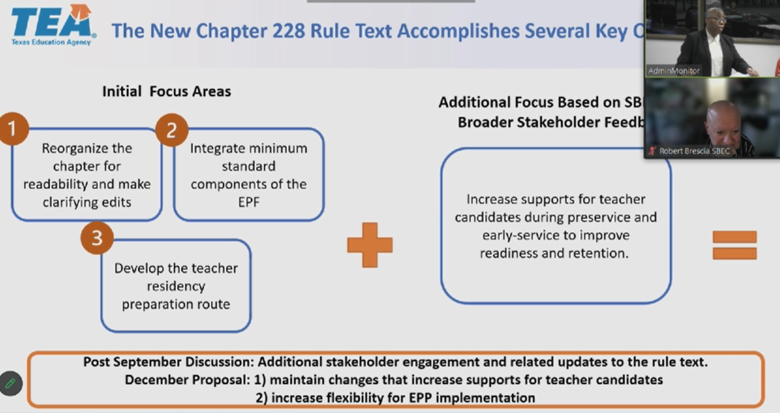
- Staff notes additional supports needed back by research which includes that later hires are less effective, training should be focused and practiced-based, job-embedded coaching has largest impact, and mentoring quality matters


- Staff reviewed proposed changes that relates to the research which included enhance field based experiences, strengthen pre-service training, and improve support for late hire candidates
- Staff reviewed updates on FBE (enhanced field based experiences)
- Field based experience could include summer school but they added substitute teaching and expanded flexibility to include teachers of record, emergency permit and educational aides

- Staff reviewed updates on supporting later hire candidates

- Second sets of proposed supports include support for clinical teaching, internship and residency

- An area where they have engaged in a lot of deep discussion was informal observations and coaching
- Feedback is to allow after first informal observation to happen in person or virtually
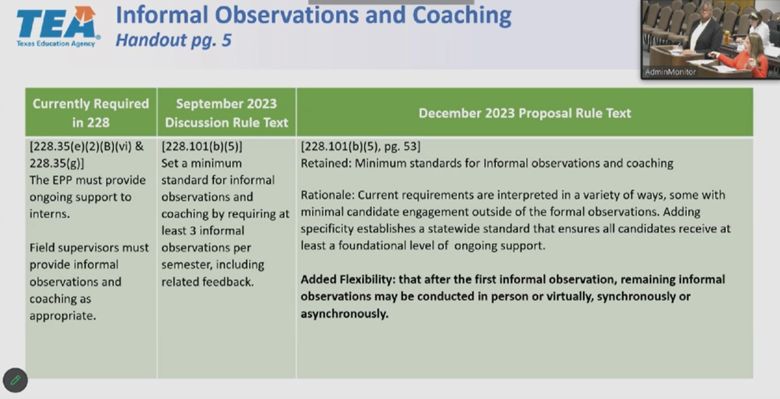
- Formal observation additions they point out, recommended increase of four observations is a technical change since they went from weeks to hours & increase from 3 to 5 hours on probationary certificate
- First formal observation will occur in first 4 weeks but it creates a technical challenge so staff is working to update online system so requirement can be implemented

- Regarding field supervisor requirements, staff is recommending an exemption is supervisor maintains an active T-TESS certification

- Heard from stakeholders of challenge in residency requirements, so that is accounts for unintended disruptions (carve out for certain weeks that are less than 3 days)
- There is a new proposed figure to summarizes the evidence that would be needed
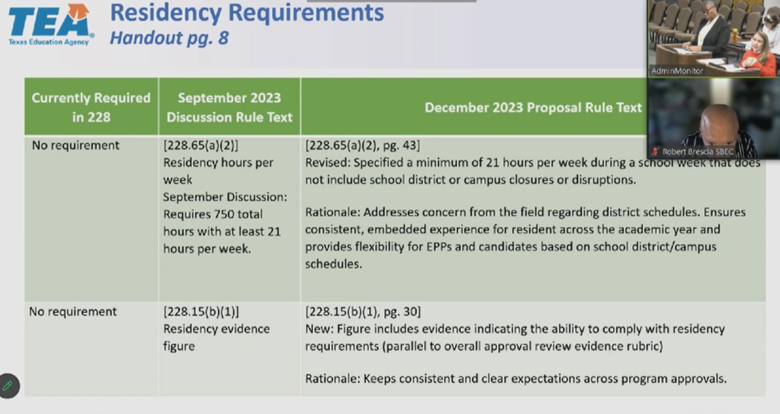
- A Residency rubric was drafted based on residency route requirements and evidence chart then updated based on stakeholder feedback, rubric is still in early draft form
- Evidence chart lives in rule and rubric is a programmatic tool
- Proposed new 228 residency route implementation
- Rule effective Sept. 1, 2024
- Applications open April 2024 and review of EPP application with SBEC approval of first batch likely around Sept. 2024
- Likely first year of actual implementation would be 2025-26 where transfer candidates could be completing residency years and new candidates admitted to residency route
- Staff reviewed substitute rule text based on ongoing feedback and would also address some of the comments heard in the meeting during public comments
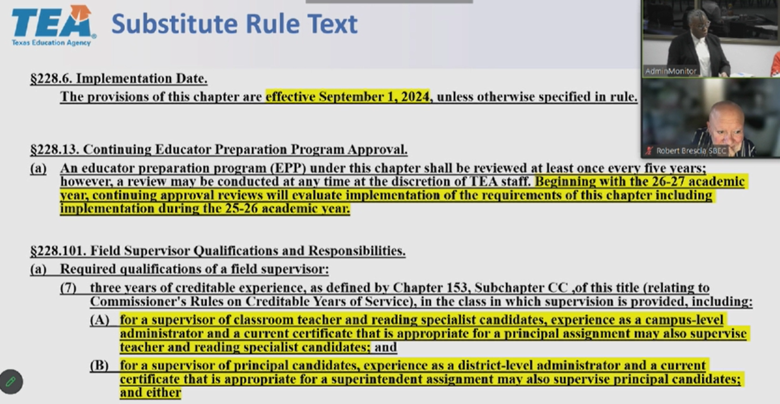
- Rulemaking process goal to finish will be in April but in 2023-24 programs will be held accountable under the current requirements but staff requesting change in language to incorporate rule text to give program additional flexibility and time
- Such as the addition of language on the continuing education preparation program (EPP)
- They will continue to do reviews but trying to address pre-and post date rules impact to candidates
- There will also be additional rulemaking from ASEP accountability to align with their changes

- Next steps include proposing rules this month, adopt Feb 2024 to be on target to have rules become effective in September
SBEC Discussion on Item #9
- SBEC member – appears concerns on implementation date is addressed by suggested changes from staff
- SBEC member – would like continue exploration of implementation date, what does it mean to hold 25-26 accountable? Is it candidates admitted or completed? Request continued listening to field for comments.
- SBEC member – thinks survey should be looked at that is given to the interns in order for it to align to code, ask if an official contract from district is needed to confirm hiring, questions overall are how to document and what would they need in place if they went through an audit…could it be more specific and could documentation be in place so they can be in compliance
- Do provide specificity in some parts, but also want to provide flexibility as well
- Will continue to work on webinars and guidance in the field as rules are implemented
- SBEC member – important to continue to be flexible, think of quality over quantity for example…some candidates will need support than others so would hate to have to check off 3 observations for each candidate when another candidate may need less and another one more….differentiation is needed and also wants to have more frequent governance meetings
- Hard balance to walk but points out language in certain places that say “as needed”
- SBEC member – can you address what you heard in field that brought you to decisions on observation?
- Thinking about short cycle formative coaching practices that research supports makes the difference, shorter but more frequent touch points
- Trying to be responsive to the field so not all coaching opportunities need to be in person
- SBEC member – whatever menu is put together, agree flexibility is needed but also appreciate more frequent support given the change in times, having guidelines will give clear structure and minimums should be in place
- SBEC member – sees importance with having a floor for support so equitable support for those candidates that are doing well and struggling
- Chair – points out they don’t regulate DOI and uncertified teachers, but do have power to say what are minimum expectations for certifications…do they want to lower bar to match DOI or do they increase so outcomes are better and outperform…hear from board to focus on research based requirements that show most impact on teachers and students
- Chair – focus on minimum requirement for job embedded coaching seems like right piece to focus on
- SBEC member – wants to set high bar and maintain high bar
- SBEC member – hope is that district will want certification because it means more
- SBEC member – not a lot of room for change after it is published in the Texas Register
- Technical edits and minor changes can be made
- If the board wants to make substantive changes then would need to pull rule down and resubmit
- Motion to approve the propose repeal of and new 19 TAC Chapter 228, Requirements for Educator Preparation Programs to be published as presented in the Texas Register – was offered and seconded
- Motion carries
Staff Presentation on Item #10
- Link to material
- Staff began discussion on proposed changes to Chapter 233, Categories of Classroom Teacher Certificates
- Chapter 233 includes 16 subsections – adding in 5 new core related certificates and a new bilingual special education certification
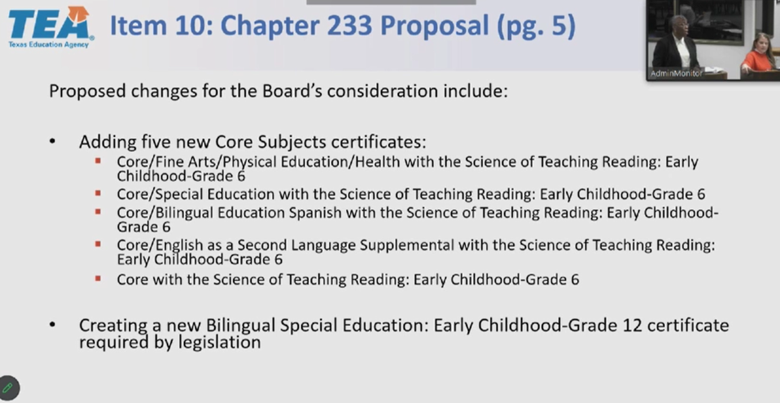
- SBEC member – what is proposed timeline for implementation?
- Majority come online in 2027, and CORE with ESL comes online in 2028
- Motion to approve the proposed amendments to 19 TAC Chapter 233, Categories of Classroom Teaching Certificates to be published as presented in the Texas Registered – was offered and seconded
- Motion carries
Staff Presentation on Item #11
- Link to material
- Staff presents on item #11 – proposed amendments to chapter 239, Student Services Certificates, Subchapter A, School Counselor Certificate
- Proposed amendment is in response to recent legislation SB 798, prohibited counselor requiring to have experience as a classroom teacher
- There are currently 4 requirements, and this removes the last requirement
- This is already in effect, this is just cleaning up the rule

Public Testimony on Item #11
Dr. Elizabeth Rodgers, Texas School Counseling Association and Educator at West Texas A&M
- Supports Work but would like to offer some suggestions on language, many states do not require counselors to hold a teaching certificate but they do require a number of other things
- TSCA proposes the following addition to the rule: adding complete certain minimum number of hours in program or completion of program, approved by SBEC
- Knowledge of Texas model is beneficial for counselor, this language opens up language for those who have not worked in the school so believes mentorship is vital
SBEC Discussion on Item #11
- SBEC member – Does approving this language allow us to come back and consider?
- Tonight is approving this as a proposal but can always come back and look at rules
- Chair – thinks it may be cleanest to do the legislative implementation first
- SBEC member – could add school counseling as a masters?
- Chair – need to explore it more, this is about a classroom teacher
- Chair – execute this and then revisit
- SBEC member – there has been a lot legislatively that has changed but agrees more discussion is needed by board members
- Motion to approve the proposed amendments to 19 TAC Chapter 239, Student Services Certificates, Subchapter A, School Counselor Certificate to be published as presented in the Texas Registered – was offered and seconded
- Motion carries
SBEC Recessed for the Day